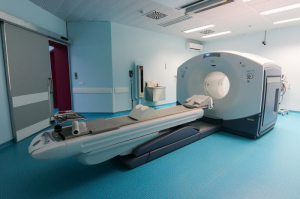by
John R. Fischer, Senior Reporter | October 18, 2017

Researchers have developed a radiotracer
for PSMA PET/CT scans that can be
produced in a matter of minutes
A radiotracer requiring less production time may prompt an increase in prostate-specific membrane antigen (PSMA) PET/CT scans for imaging prostate cancer.
Researchers from Kings College London, Theragnostics, the Peter MacCallum Cancer Centre and the Sir Peter MacCallum Department of Oncology at the University of Melbourne have produced the tracer, Ga-68-THP-PSMA in a matter of minutes, allowing for a higher number of doses to be manufactured in quicker time for imaging patients. The safety of the tracer was tested in a Phase I study, published in
The Journal of Nuclear Medicine.
“What we’ve done is deskilled the process and come up with the equivalent of a technetium kit,” Greg Mullen, CEO of Theragnostics and one of the authors of the study, told HCB News. “The technetium generator elutes the technetium. When you put it into a cold kit, you incubate it and following quality of control, it’s ready for injection in a matter of minutes. That’s what our technology has allowed us to do, is have a cold kit for PET.”



Ad Statistics
Times Displayed: 2548
Times Visited: 12 Fast-moving cardiac structures have a big impact on imaging. Fujifilm’s SCENARIA View premium performance CT brings solutions to address motion in Coronary CTA while delivering unique dose saving and workflow increasing benefits.
HBED chelator in Ga-68-HBED-PSMA or DOTA in Ga-68-DOTATATE require pH adjustment, heating and cooling, possible purification, the presence of a cyclotron as well as other factors, making manufacturing more complex and time-consuming.
Ga-68-THP-PSMA is produced using a Ga-68 generator and a cold kit vial. The generator is eluted with hydrochloric acid to produce a PET isotope, gallium-68, which is then added to a cold kit vial for incubation. Following quality of control, the tracer is then ready for injection in mere minutes.
The safe use of the tracer was tested in a phase I study consisting of 14 patients, each with adenocarcinoma of the prostate, who were divided into two groups. Group A consisted of naive patients undergoing prostatectomy while Group B was made up of those with metastatic prostate cancer. Researchers administered and compared the use of Ga-68-THP-PSMA to standard of care, Ga-68-HBED-PSMA-11 PET/CT, in both sets of patients.
Findings found administration of the tracer to be safe, with no occurrences of adverse events. Ga-68-THP-PSMA correlated with histopathologic PSMA expression on pathology findings following prostatectomy for Group A patients, demonstrating direct noninvasive imaging of prostate cancer. Background physiologic uptake was found to be lower with Ga-68-THP-PSMA, compared to Ga-68-HBED-PSMA in Group B, producing no changes in the management of patients, as well as concordance in the number of metastases identified.
Mullen says the results and quicker production of Ga-68-THP-PSMA not only prove its potential as a standard tool for prostate cancer imaging, but the greater use of PSMA PET/CT scans in general, especially as compared to conventional imaging for determining the extent to which cancer has spread in the body, and if treatments such as surgery or radiotherapy are the best courses of action.
"PSMA PET imaging will become the new standard of care imaging," he said. "PSMA PET imaging has the potential of picking up many more lesions than CT, MR and/or a bone scan."
Phase II trials are set to begin soon in the U.K., with researchers hoping to start a multi-international Phase III trial sometime in 2018 or 2019.

